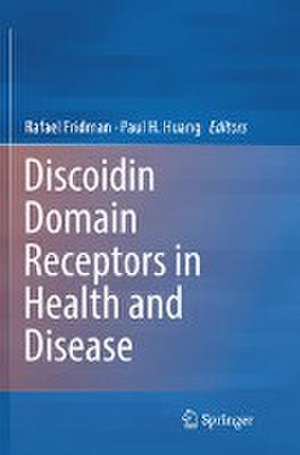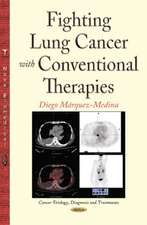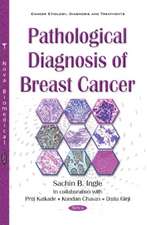Discoidin Domain Receptors in Health and Disease
Editat de Rafael Fridman, Paul H. Huangen Limba Engleză Paperback – 9 iun 2018
| Toate formatele și edițiile | Preț | Express |
|---|---|---|
| Paperback (1) | 1098.48 lei 6-8 săpt. | |
| Springer – 9 iun 2018 | 1098.48 lei 6-8 săpt. | |
| Hardback (1) | 1105.40 lei 6-8 săpt. | |
| Springer – 14 aug 2016 | 1105.40 lei 6-8 săpt. |
Preț: 1098.48 lei
Preț vechi: 1156.29 lei
-5% Nou
Puncte Express: 1648
Preț estimativ în valută:
210.21€ • 218.14$ • 175.71£
210.21€ • 218.14$ • 175.71£
Carte tipărită la comandă
Livrare economică 17-31 martie
Preluare comenzi: 021 569.72.76
Specificații
ISBN-13: 9781493981823
ISBN-10: 149398182X
Ilustrații: XIV, 355 p. 82 illus., 55 illus. in color.
Dimensiuni: 155 x 235 mm
Greutate: 0.52 kg
Ediția:Softcover reprint of the original 1st ed. 2016
Editura: Springer
Colecția Springer
Locul publicării:New York, NY, United States
ISBN-10: 149398182X
Ilustrații: XIV, 355 p. 82 illus., 55 illus. in color.
Dimensiuni: 155 x 235 mm
Greutate: 0.52 kg
Ediția:Softcover reprint of the original 1st ed. 2016
Editura: Springer
Colecția Springer
Locul publicării:New York, NY, United States
Cuprins
Part I: Discoidin Domain Receptor biology and roles in physiology.- DDRs: Binding properties, cell adhesion and modulation of integrin function.- DDRs and collagen fibrillogenesis.- DDR Structural Biology.- DDR Mouse models.- DDR in Invertebrates.- Part II: Discoidin Domain Receptors in Cancer.- Discoidin Domain Receptors and Disease.- Discoidin Domain Receptors in Normal Mammary Development and Breast Cancer Progression.- Discoidin Domain Receptors in Lung Cancer.- DDRs in healthy and cancerous reproductive systems.- Small Molecule Inhibitors of Discoidin Domain Receptors.- Discoidin Domain Receptor Signaling Networks.- Discoidin Domain Receptor Signaling and Pharmacological Inhibitors.- Functions of DDR1 in epithelial cell differentiation.- Part III: Discoidin Domain Receptors in other pathologies.- Discoidin Domain Receptor 2 in Development of Osteoarthritis.- DDR1 in Renal Function and Disease.- Discoidin DomainReceptors in Liver Fibrosis.- The role of DDRs in Atherosclerosis.- Discoidin Domain Receptors in Cardiac Development.
Notă biografică
Rafael Fridman, Ph.D, is a Professor in the Department of Pathology at Wayne State University and a Scientific Member of the Barbara Ann Karmanos Cancer Institute, in Detroit, Michigan. Dr. Fridman is an expert on discoidin domain receptors and matrix metalloproteinases and his research focuses on understanding the molecular and cellular mechanisms that regulate cell-matrix interactions in normal and pathological processes. Dr. Fridman has published over 120 papers in his career, which have been cited over 6800 times, aoccording to Scopus. His h-Index is 40, which is outstanding (20 = good, 40 = outstanding, 60= exceptional). Please see attached Scopus Author Profile for additional details and metrics. Dr. Fridman's extensive CV is also attached herewith.
Textul de pe ultima copertă
The interactions of cells with their surrounding extracellular matrix (ECM) plays a pivotal role in driving normal cell behavior, from development to tissue differentiation and function. At the cellular level, organ homeostasis depends on a productive communication between cells and ECM, which eventually leads to the normal phenotypic repertoire that characterize each cell type in the organism. A failure to establish these normal interactions and to interpret the cues emanating from the ECM is one of the major causes in abnormal development and the pathogenesis of multiple diseases. To recognize and act upon the biophysical signals that are generated by the cross talk between cells and ECM, the cells developed specific receptors, among them a unique set of receptor tyrosine kinases (RTKs), known as the Discoidin Domain Receptors (DDRs). The DDRs are the only RTKs that specifically bind to and are activated by collagen, a major protein component of the ECM. Hence, the DDRs are part of the signaling networks that translate information from the ECM, and thus they are key regulators of cell-matrix interactions. Under physiological conditions, DDRs control cell and tissue homeostasis by acting on collagen sensors; transducing signals that regulate cell polarity, tissue morphogenesis, cell differentiation, and collagen deposition. DDRs play a key role in diseases that are characterized by dysfunction of the stromal component, which lead to abnormal collagen deposition and the resulting fibrotic response that disrupt normal organ function in disease of the cardiovascular system, lungs and kidneys, just to mention a few. In cancer, DDRs are hijacked by tumor and stromal cells to disrupt normal cell-collagen communication and initiate pro-oncogenic programs. Importantly, several cancer types exhibit DDR mutations, which are thought to alter receptor function, and contribute to cancer progression. Therefore, the strong causative association between altered RTK functionand disease it is been translated today in the development of specific tyrosine kinase inhibitors targeting DDRs for various disease conditions. In spite of the accumulating evidence highlighting the importance of DDRs in health and diseases, there is still much to learn about these unique RTKs, as of today there is a lack in the medical literature of a book dedicated solely to DDRs. This is the first comprehensive volume dedicated to DDRs, which will fill a gap in the field and serve those interested in the scientific community to learn more about these important receptors in health and disease.
Caracteristici
Provides critical reviews of an unexplored area of research focused on a unique set of RTKs that signal in response to collagen Elucidates signaling networks in cancer cells activated by the extracellular matrix Discusses potential new targets in cancer treatment














